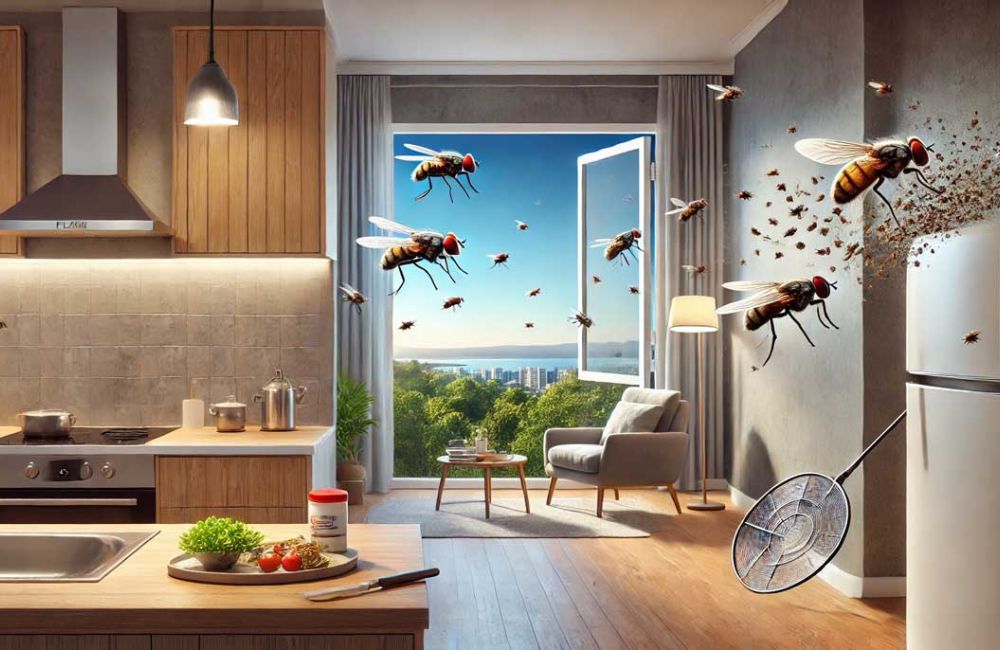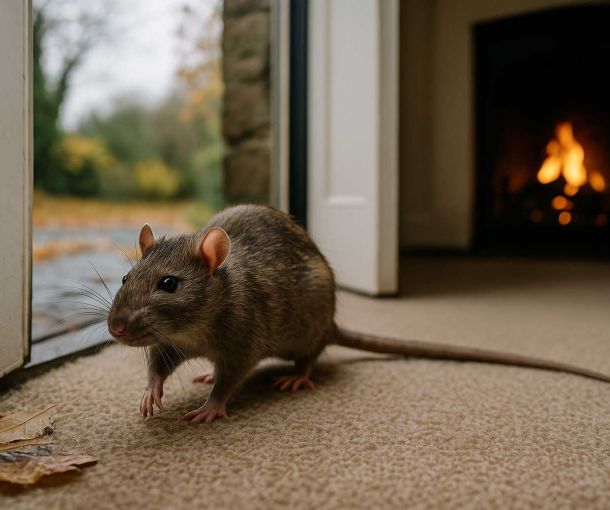House Flies: How To Get Rid Of Them Quickly?

Flies in your house can be a nuisance. This guide will show you how to get rid of flies in the house quickly. From identifying them to using effective traps and natural remedies, keep reading to make your home fly-free.
Key Takeaways
- House flies are the most common indoor flies and pose health risks by carrying diseases; understanding their habits is crucial for effective management.
- Quick methods to eliminate flies include homemade traps using apple cider vinegar, isopropyl alcohol sprays, and physical methods like fly swatters and UV zappers.
- Preventing infestations involves sanitation, sealing entry points, and proper waste management, while advanced solutions like professional pest control may be necessary for severe cases.
Identifying Common Flies in Your House
Various species of flies can find their way into your home, each with its characteristics and habits. The most common ones include house flies, fruit flies, and ways to trap flies.
Recognising the differences between these common flies helps in managing them effectively.
House Flies
House flies, scientifically known as Musca domestica, are the most prevalent flies found in homes, accounting for about 90 per cent of the flies you encounter indoors. They have grey bodies with four distinctive dark stripes on their backs, making them easy to identify. House flies are attracted to decaying food, organic matter, food scraps, garbage, and excrement, making your kitchen and waste bins their favourite spots. However, the presence of dead flies can indicate a larger infestation problem.
These insects pose significant health risks as they can carry bacteria and germs that transmit diseases such as food poisoning and cholera. House flies typically lay eggs on warm, moist materials like food waste, rotting meat, and feces, with eggs hatching within 12 to 24 hours.
Being aware of their habits and preferences allows targeted efforts to eliminate them.
Fruit Flies
Fruit flies are small, often measuring about 1/8 inch in length, and can be identified by their red eyes. They are primarily attracted to rotting food, especially fruits and vegetables, making your kitchen a prime location for these tiny invaders.
A homemade trap for fruit flies is both simple and effective. Fill a bowl with apple cider vinegar and add a drop of dish soap to break the surface tension, causing the flies to sink. Old beer or leftover wine can also be used effectively.
Fungus Gnats
Fungus gnats are often found in houseplants, feeding on organic matter in the soil. These tiny flies are drawn to the moist environments of potted plants, which provide ideal conditions for their larvae to thrive.
While they are not as harmful as house flies or fruit flies, fungus gnats can still be a nuisance, managing moisture levels in houseplants and using well-draining soil can reduce their presence.
Quick Methods to Get Rid of House Flies

Quick and effective methods are essential when dealing with a fly infestation. Understanding what causes infestations helps eliminate house flies.
Consider these practical solutions to eliminate these pests swiftly.
Apple Cider Vinegar Traps
One of the most effective homemade traps for house flies involves using apple cider vinegar. Mix equal parts dish soap and apple cider vinegar, then add sugar to enhance its attractiveness to flies.
The dish soap disrupts the surface tension, causing the flies to sink and drown when they come into contact with the liquid.
Isopropyl Alcohol Spray
Isopropyl alcohol spray is a quick and easy chemical-based solution to kill house flies on contact. Ensure the spray is safe for food preparation areas and avoid contact with food when using it indoors.
This method is effective for eliminating killing flies congregating in hard-to-reach places where they congregate.
Fly Swatters and UV Zappers
Fly swatters provide a quick, hands-on method for eliminating house flies without the use of chemicals. Using a swatter and removing attractants offers a simple yet effective DIY solution. On the other hand, UV zappers use ultraviolet light to attract and electrocute flies, providing a more automated solution for fly control.
These zappers are especially useful in domestic settings where flies tend to gather around light sources. Combining these methods can help you maintain a fly-free environment, ensuring your home remains comfortable and hygienic.
Natural Remedies to Repel Flies
Natural remedies provide a safe way to repel flies without harsh chemicals, especially when windows and doors are open during warm months.
Here are some natural ways to get rid of flies at bay.
Essential Oils
Lavender, peppermint, eucalyptus, and lemongrass are essential oils that effectively repel flies. They can be used in diffusers or mixed with water and sprayed around the house.
Placing natural repellents like citronella or eucalyptus oils near doorways helps deter flies from entering your home.
Herbs and Plants
Herbs and plants serve as effective natural remedies to keep flies away. Planting rue near entry points can repel flies due to its strong scent.
These herbs not only repel flies but also add greenery, enhancing your home’s aesthetic appeal.
Citrus Peels
Citrus peels naturally repel flies. Placing orange or lemon peels around the house can deter them effectively. The scent of citrus peels is known to create an unpleasant environment for flies, making it a simple yet effective way to prevent them from entering.
Preventing Fly Infestations
Preventing fly infestations is essential for maintaining a clean and hygienic home. Combining sanitation, exclusion, and proper waste management effectively deters flies.
Here are practical methods to keep your home fly-free.
Cleaning and Sanitation
Maintaining cleanliness and proper waste management helps keep house flies away. Avoid leaving dirty dishes out overnight, clean up spills immediately, and wipe down surfaces to eliminate potential attractants.
Crumbs, spills, dirty dishes, bins, and unattended pet food commonly attract flies. Addressing moisture issues from leaky taps or unclean pet accidents and improving ventilation can help reduce fly attraction and prevent breeding.
Sealing Entry Points
Sealing cracks and gaps around doors, windows, and vent pipes significantly reduces fly entry. Keeping windows and doors closed and ensuring screens are intact effectively prevent flies from getting inside.
Proper Waste Management
Proper waste management prevents fly infestations in the home. Regularly removing garbage and ensuring bins are sealed help deter fly breeding.
Immediate cleanup of pet waste prevents flies from using it as a food source.
Dealing with Persistent Fly Problems
Flies can be a persistent nuisance, often requiring multiple strategies to manage pesky insects. When natural methods aren’t enough, more advanced solutions may be necessary.
Here are effective ways to handle a persistent fly problem.
Professional Pest Control
For severe infestations, calling a professional pest control service is best. A tailored treatment plan may include insecticide sprays, baiting systems, and fumigation.
Services like Merlin specialise in eliminating and preventing all kinds of pests, including flies.
Chemical Insecticides
In urban settings, chemical insecticides are often necessary to quickly reduce house fly populations that are resistant to other control methods. Pyrethroids and imidacloprid commonly target their nervous systems.
Advanced Fly Traps
Advanced fly traps, like ultraviolet light traps, provide effective solutions for persistent fly problems. They attract flies without spreading pathogens, making them a safe and efficient option.
Keeping Flies Away During Open Door Events
Keeping flies away during events with frequently opened doors can be challenging. Methods such as using water bags, fly screens, and maintaining airflow can help.
Here are practical solutions to ensure your gatherings remain fly-free.
Fly Screens
Fly screens prevent insects from entering your home while allowing fresh air to circulate. Screen doors can be customised to fit various door and window styles for comprehensive coverage.
Magnetic screens offer a versatile option for temporary use, making them ideal for events.
Maintaining Airflow
The airflow reduces fly attraction and keeps them from entering your home. Positioning fans near open doors creates a breeze, making it difficult for flies to enter. This simple method helps maintain a comfortable environment during open-door events.
Natural Repellents Near Entries
Placing aromatic plants like basil and eucalyptus near entryways deters flies naturally. These plants emit unpleasant scents to flies, creating a natural barrier. Using natural repellents near doors keeps flies away and enhances the aesthetic of your entry area.
Summary
In summary, keeping your home fly-free involves a combination of identification, quick elimination methods, natural remedies, and preventative measures. Understanding the types of flies, employing effective traps, maintaining cleanliness, and using natural deterrents can significantly reduce fly populations. Professional pest control and advanced traps provide robust solutions for persistent issues. By implementing these strategies, you can ensure a comfortable and hygienic living environment.
Frequently Asked Questions
How can I quickly get rid of house flies?
To quickly eliminate house flies, use apple cider vinegar traps, isopropyl alcohol spray, or a fly swatter. These methods are effective and easy to implement.
What natural remedies can I use to repel flies?
Essential oils, particularly eucalyptus, peppermint, and tea tree, along with herbs like basil and lavender, are effective in repelling flies. Additionally, using citrus peels can enhance these natural deterrents.
How can I prevent fly infestations in my home?
To prevent fly infestations, maintain cleanliness in your home, seal off entry points, and manage waste effectively. This proactive approach will greatly reduce the likelihood of flies becoming a nuisance.
When should I consider professional pest control for flies?
Consider professional pest control for flies if you notice a severe infestation that you cannot manage on your own. Taking immediate action can help prevent further complications and ensure effective treatment.
What are some effective methods to keep flies away during open-door events?
To effectively keep flies away during open-door events, use fly screens, ensure good airflow with fans, and place natural repellents near entry points. These methods create a more pleasant environment for your guests.
Where to Next?
- Home
-
Domestic Pest Control
-
Commercial Pest Control
-
Eco-Friendly Pest Control
-
Emergency Pest Control
-
Rodent Control
-
Wasp Control
-
Bed Bug Treatment
-
Flea Control
-
Ant Control
-
Cockroach Control
-
Moth Control
-
Fly Control
-
Stored Product Insect Control
-
Spider Control
-
Carpet Beetle Treatment
-
Woodworm Treatment
-
Bird Control
-
Fox Control
-
Squirrel Control
-
Insect Control
-
Booklice Control
- Blog















Leave a Reply